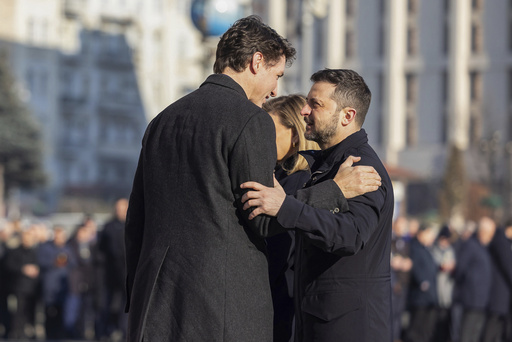KYIV, Ukraine — A gathering of leaders hailing from Europe and Canada has converged in Ukraine’s capital to commemorate the third anniversary of Russia’s invasion. This group includes high-profile figures such as European Commission President Ursula von der Leyen and Canadian Prime Minister Justin Trudeau, who are engaged in discussions with President Volodymyr Zelenskyy about ongoing support.
The significance of this anniversary is underscored by a noticeable shift in U.S. policies regarding both Russia and Ukraine, particularly under President Donald Trump. Alongside this, critical discussions about the potential for peace talks and Ukraine’s aspirations for membership in the European Union and NATO remain prominent issues.
In the latest developments, the U.N. General Assembly adopted a resolution from Ukraine demanding the immediate withdrawal of all Russian troops. The resolution passed with a vote of 93 in favor, 18 against, and 65 abstentions—a decline from earlier resolutions where over 140 nations condemned Russia’s actions. This European-backed resolution came just before a vote on a U.S. proposal that sought an end to the war but did not mention Russia’s invasion specifically.
Moreover, Northern European nations have committed to training and equipping a brigade of the Ukrainian army, comprising between 3,000 and 5,000 soldiers, as Norweigan Prime Minister Jonas Gahr Stoere announced. Norway has also pledged around $11.2 million to strengthen the energy systems in Ukraine and Moldova.
Ursula von der Leyen, the head of the European Union’s executive branch, expressed optimism towards Ukraine’s potential accession to the EU, suggesting it could happen before 2030 if reforms continue. She underscored that EU membership is contingent upon meeting specific criteria, while emphasizing the speed and quality of Ukraine’s progress as noteworthy. On the other hand, Russia remains staunchly against Ukraine’s EU or NATO membership.
In further discussions, Lithuanian Prime Minister Gitanas Nauseda emphasized the need for broader dialogue about establishing European peacekeeping forces in Ukraine after any potential ceasefire, stating clarity on this mandate is essential. He insisted on a force that would act decisively in the event of future violence.
During a virtual summit held by the G7 group, President Zelenskyy implored Trump for ongoing U.S. support as tensions between Kyiv and Washington have heightened recently. He highlighted the paramount importance of American assistance in safeguarding the lives and futures of Ukrainian families while arguing for Ukraine’s inclusion in NATO. Zelenskyy noted that NATO membership would ultimately provide a more cost-effective security solution for Ukraine compared to remaining outside the alliance.
Finnish President Alexander Stubb called on European nations to adopt a more proactive strategy in negotiations surrounding Ukraine’s future, insisting on a coherent plan for discussions with the U.S. and other partners. Meanwhile, Zelenskyy called for robust deterrence measures to prevent further Russian aggression and expressed hope for concluding the war within the year. He stressed the need for strong alliances and defense support for Ukraine.
Estonia’s Prime Minister Kristen Michal warned that an unjust peace would set a dangerous precedent globally, signaling that aggressions may be tolerated. She pointed out that this could have ramifications for various countries, including the U.S. Additionally, European Commission President von der Leyen affirmed that sanctions against Russia would remain until there is tangible evidence of a commitment to a peaceful resolution.
The UK has introduced its largest sanctions package since the onset of the conflict, targeting 107 entities linked to Russia’s military supply chain, which includes asset freezes for Russian business figures. Furthermore, Scandinavian countries are increasing their military assistance, with Sweden committing significant resources towards air defense systems.
Both Spain and Denmark are preparing to enhance military support for Ukraine, with Spain offering a comprehensive 1 billion-euro package, while Denmark is contributing ammunition equivalent to about $280 million. In Estonia, the defense minister reiterated an unwavering stance against recognizing borders established by military force, aligning Estonia’s values closely with Ukraine’s fight for sovereignty.
In a notable statement, the Canadian Prime Minister praised President Zelenskyy’s fortitude while countering narratives suggesting that Ukraine bore any blame for the conflict, affirming that Russia was solely responsible for initiating aggression against Ukraine.
As diplomatic dialogues unfold, Turkish Foreign Minister Hakan Fidan reiterated Turkey’s readiness to mediate conversations between Russia and Ukraine, highlighting the nation’s unique position to facilitate negotiations. Conversely, Russia maintains that Ukraine must not join NATO as part of any peace agreements, in stark contrast to Ukraine’s aspirations.
Finally, the EU’s recent sanctions against Russia—including measures aimed at its shipping sector—underscore their determination to respond to ongoing hostilities. With a focus on preserving Ukraine’s sovereignty, the EU remains committed to ensuring such aggression is met with meaningful consequences.




